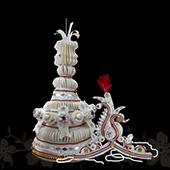West Bengal, a northern state of India, houses a culturally rich capital city, Kolkata which was previously known as Calcutta. This city is situated at the river Hoogly banks comprising three villages Kalikat, Gobindapur, and Sutanuti. Kolkata is well known for its history, ranging from the Indian freedom struggle, leftist Naxalite movements, and trade union formations. From the celebratory culture of the city, it is evident that the place is rooted in traditions and rituals valued by the people of Bengal. One such tradition is the wearing of Topor and Mukut by the bride and groom during a Bengali wedding. According to a folktale, the origin of Topor is connected to the Hindu god Shiva, who, for his wedding ceremony, demanded a special crown finished by artist Vishwakarma. Vishwakarma, skilled only in hard metalworks, handed over the task to young Malakar, who finished a headgear using shola. Since then, the Topor is used extensively in Bengali weddings, and the cult of people who create shola pith Topar is called Malakars, meaning “makers of garlands”. Hence Topors made of shola still have significant importance, as they are believed to bring good luck.
Shola pith, also known as ‘Sholar Kaj’ is a dried milky-white spongy plant matter derived from a tall perennial plant that can be pressed and shaped into delicate objects of art. It is harvested from waterlogged marshy areas, hence easily available for production. Households use this as a symbol of sanctity at religious events and also as decorative items. There are two types of shola, Kath shola, a harder version, and Bhatua shola, which is soft and light. A premium quality pith comes in pure white color that doesn't possess nodes and has soft barks while coming to the pith. This plant which grows up to 7 to 8 feet in height and 2 to 3 inches in diameter, basically grown in states like Bengal, Assam, Orissa, Andhra Pradesh, and Tamil Nadu. Mr. Ramapada Neogi and Mr. Koushik Neogi from Uluberia village of Howrah district from West Bengal have been making Topors and Mukut for decades, which are used during Bengali weddings.




